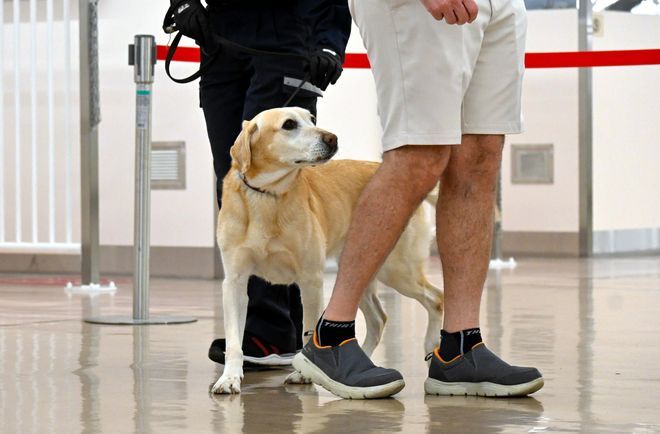Sniffer dogs are back in action as tourist cruise volumes rebound
Drug Enforcement TechPosted by AI on 2025-08-25 09:40:02 | Last Updated by AI on 2025-08-26 13:39:50
Share: Facebook | Twitter | Whatsapp | Linkedin Visits: 0

Dogged border officers at Kobe port are reintroducing drug-sniffing dogs in the hopes of catching concealed contraband now that cruise ships are returning to pre-pandemic inbound passenger levels.
According to Kobe Customs, drug-detecting dogs are vastly more efficient than humans in detecting hemp and banned chemicals at border control. Given the volume of passengers that can arrive on a single cruise liner (up to 5000 passengers), the dogs are essential in ensuring efficient border control.
Covid travel restrictions resulted in a steep decline in cruise ships - 34 called at Kobe port in 2020, a far cry from the 134 who appeared in 2019. However, dog handlers are now training the dogs again in preparation for their return to full duty. The dogs are trained to detect odors deriving from illicit substances applied to dummies.
The return of sniffer dogs is hoped to help them achieve their full potential now that inbound travelers are returning to pre-pandemic levels in large numbers.
While detection dogs have played a crucial role in customs offices across Japan since 1979, sniffer dogs made their debut at Kobe Customs in 1992. Currently, 130 drug-sniffing dogs are on duty at customs offices across Japan, and it is hoped that the dogs will help to crack down on illicit chemicals at ports and airports.
Canine variants such as the German shepherd and the Labrador Retriever are typically utilized because of their exceptional sense of smell, and dogs that are not shy and apt to show an interest in moving objects are suited to the role.
This development underscores the ongoing evolution of travel and border control in the wake of Covid-19.
Search
Categories
- Sports
- Business
- History
- Politics
- International
- Science & Technology
- Social Issues
- Disaster Management
- Current Affairs
- Education
- Startup Business
- Startup News
- Awards
- Community Services
- Fundraising Events
- Volunteer Services
- Health Initiatives
- Innovations and Initiatives
- In News
- Banners
- Awards
- Partners
- Products
- Press Releases
- News
- Fast Check
- South
- సినిమా
- Gallery
- Sunday Chronicle
- Hyderabad Chronicle
- లైఫ్ స్టైల్
- National
- క్రైం
- ట్రెండింగ్
- జాబ్స్
- అంతర్జాతీయo
- బిజినెస్
- రాజకీయం
- బిజినెస్
- సంపాదకీయం
- నవ్య
- చిత్ర జ్యోతి
- క్రీడలు
- జాతీయం
- తెలంగాణ
- తాజా వార్తలు
- మన పార్టీ
- మన నాయకత్వం
- మన విజయాలు
- డౌన్లోడ్స్
- మీడియా వనరులు
- కార్యకర్తలు
- North East Skill Center News
- Government Schemes
- Entrepreneurship Support
- Employment Opportunities
- Skill Training Programs
- Departments
- Investments
- Initiatives
- Resources
- Telangana IT Parks
- Events & Jobs
- Press Releases
- News
- Airport News
- Newtons Laws of Motion
- Karbonn in Business
- Investments in Karbonn
- Company quarterly sales
- Markets
- Auto News
- Industry
- Money
- Advertisements
- Stock target
- Company Updates
- Stock Market
- Company Sales
- Staffing and HR
- Constituency Assembly
- General News
- Srikalahasti Temple
- Bojjala Sudhir Reddy
- Technology & Innovation
- Sports
- Business
- Products
- Industries
- Services & Trainings
- Tools & Resources
- Technology Integration
- Drug Seizures & Arrests
- Telangana Narcotics
- Law & Enforcement
- Rehabilitation
- Nationwide Drug Policing
- Nigeria Seizures
- Global Operations
- Drug Awareness
- Drug Enforcement Tech
- NCB Drug Seizures
- Judicial Crackdown
- India's Surveillance Tools
- Cross-Border Links
- Women Safety
- Cyber Crimes
- Drug Abuse
- Traffic & Road Safety
- Community Connect
- Public Safety Alerts
- Citizen Assistance
- Nellore City News
- Politics & Administration
- Events & Festivals
- Agriculture & Rural
- Business & Economy
- Health & Wellness
Recent News
- Palghar district makes massive mephedrone drug bust, seizes Rs 2.42 crore worth of drugs
- Human remains finally reveal the truth: Friends charged with hiding death
- NPS vs UPS: Central government employees now have a one-time switch facility available- check details
- Revenue Employees Recharge with Sports and Culture
- Record-breaking Highway Project for Andhra Pradesh
- Inevitable access to novel therapies for respiratory illnesses
- Chandigarh Police Crack Cross-Border Narcotics Ring, Dismantle Smuggling Operations Worth Over 1 Crore
- Maximizing Wellness Programs: The Role of Engagement and Incentives